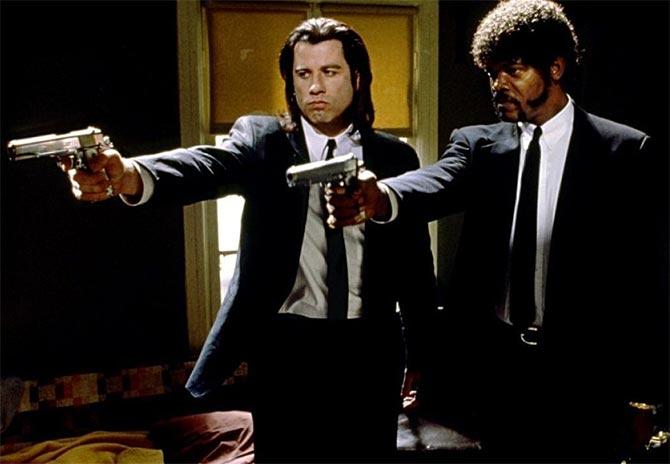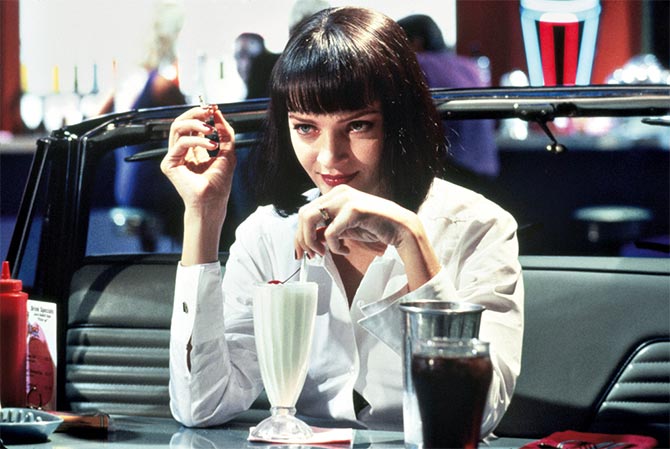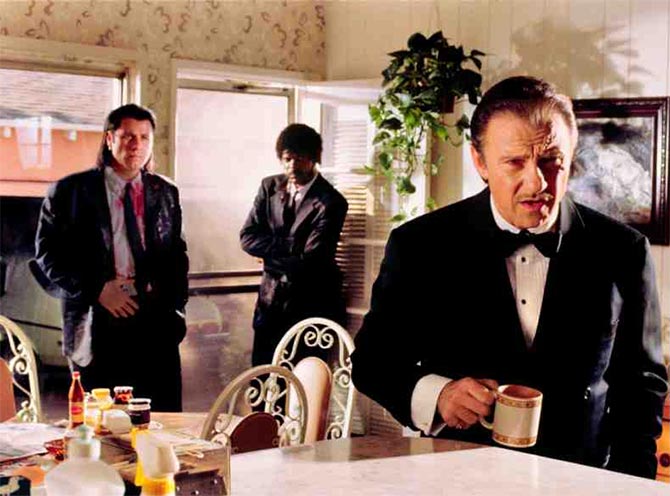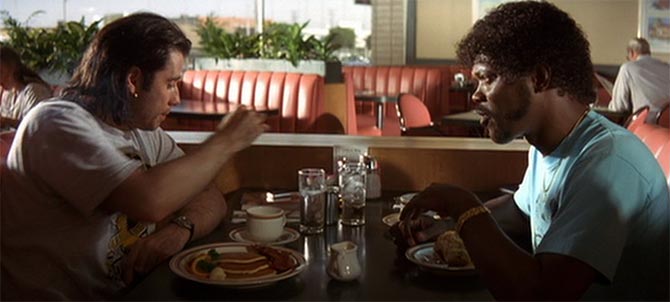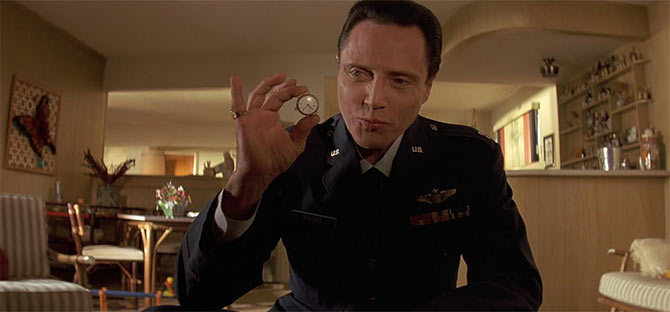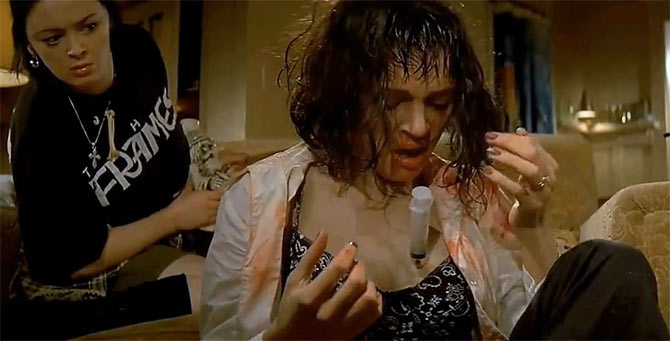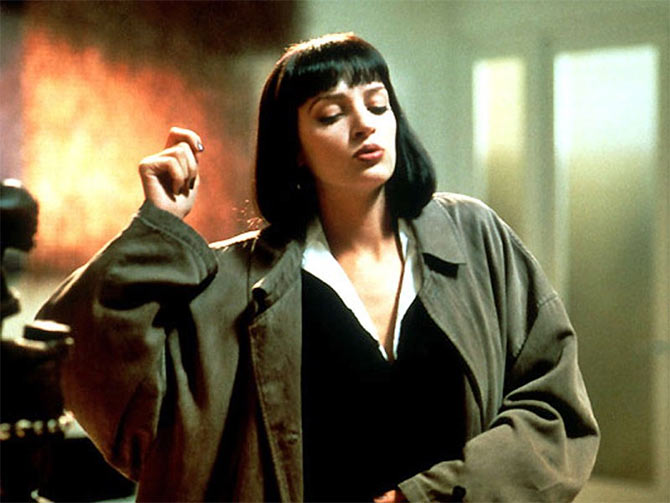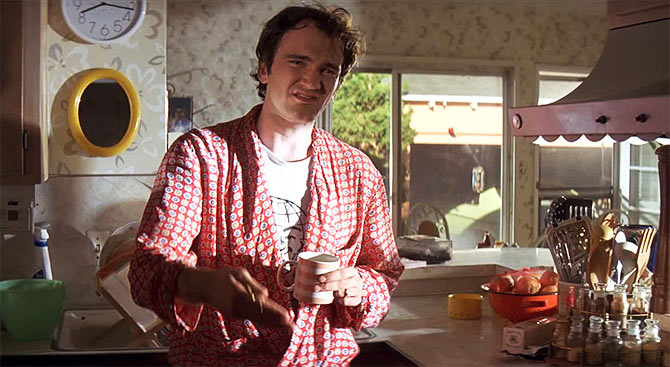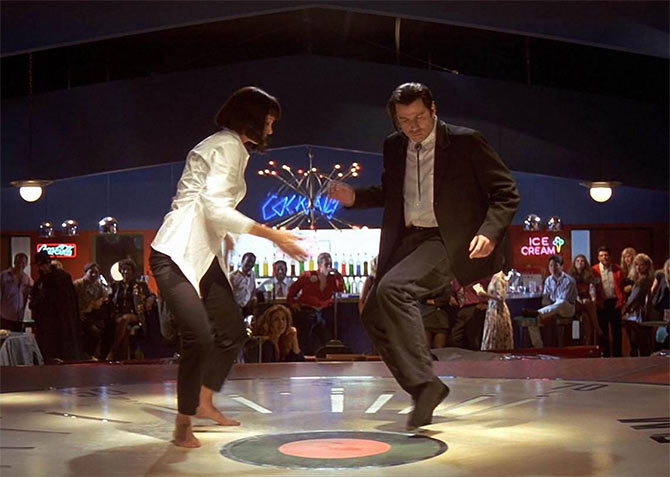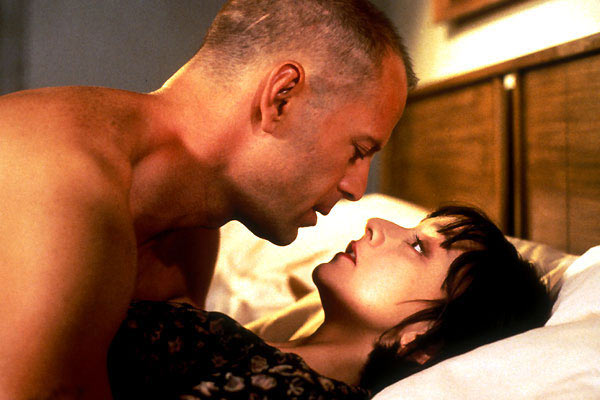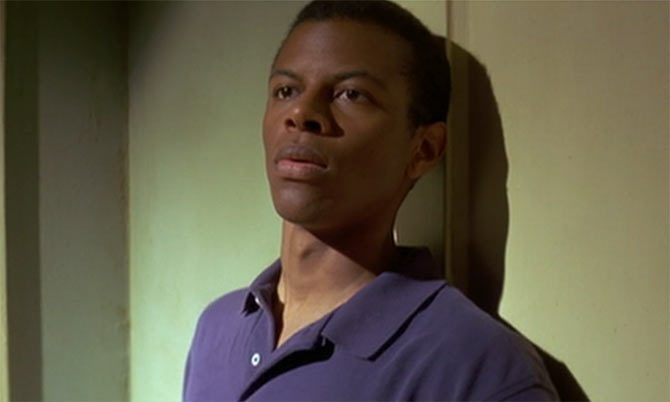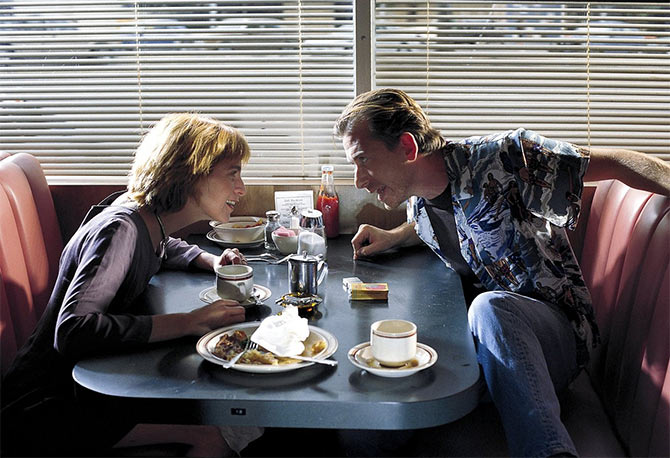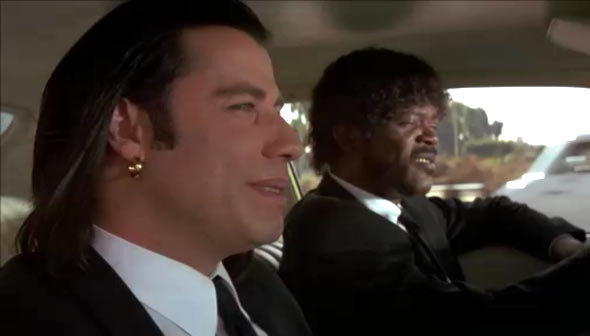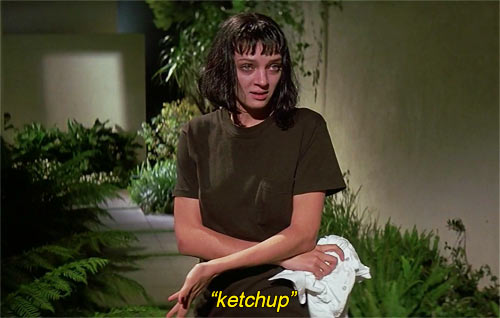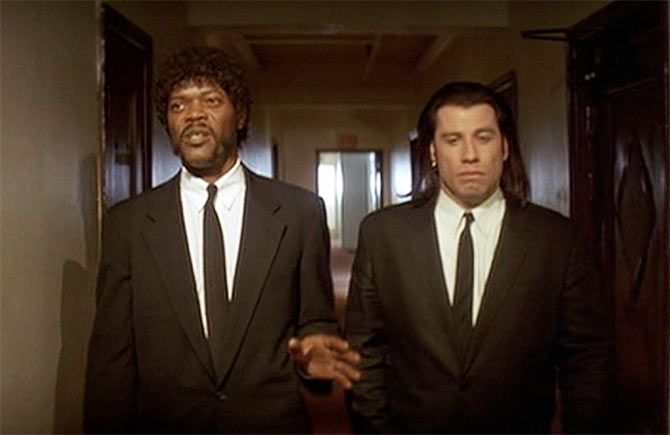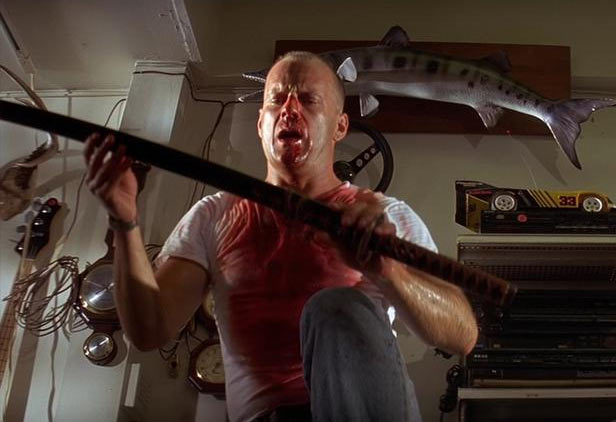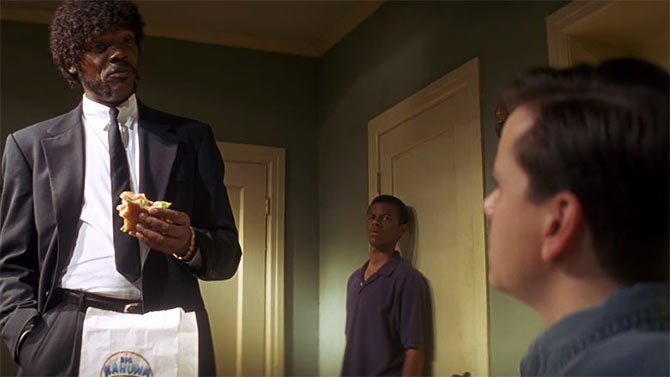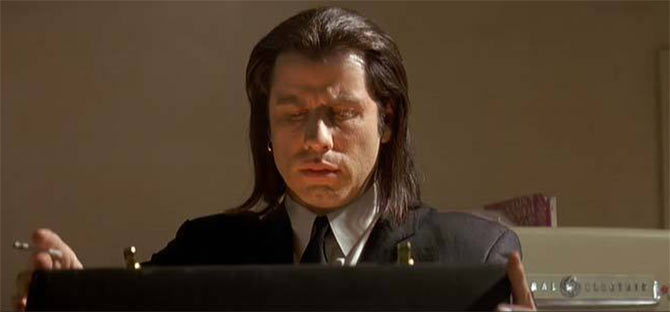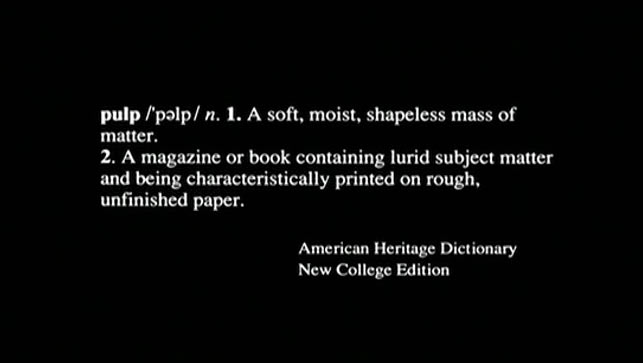 | « Back to article | Print this article |
20 reasons Why Pulp Fiction is better than your favourite film
Raja Sen celebrates 20 years of Quentin Tarantino’s Pulp Fiction.
On May 23 1994, a film called Pulp Fiction won the Palme D’or at the Cannes film festival.
Twenty years on, Quentin Tarantino’s masterpiece is hailed as an absolute classic, and is arguably the single most influential film made in the last fifty years.
It defied screenwriting rules, courses with wit and originality and is the very opposite of square, daddy-o.
To commemorate 20 years of worship, here are 20 things about Pulp Fiction that make it better than your favourite film, no matter what it may be.
The Godfather didn’t have a katana; 400 Blows didn’t have a Royale With Cheese; Breathless didn’t have Mrs Mia Wallace; Vertigo didn’t have The Wolf; and Casablanca is sorely lacking in shots of adrenaline.
In appropriately non-chronological order, then, here goes:
1. The scripture-quoting
Preachers do it, bad guys do it, zealots do it, teachers do it, even educated fleas do it -- But nobody ever quoth The Bible like Jules Winnfield.
Played by Samuel L Jackson, Winnfield chews the angry words with great deliberation before spitting them out with, as he says, furious anger.
So memorably impassioned is Jackson's Biblical spiel that his misquoted version of Ezekiel 25:17 has become bigger than the real thing.
Please click Next to see more.
2. The five-dollar milkshake
Five dollars was a lot to pay for a milkshake back in 1994, something even a well-tailored hitman like Vincent Vega (John Travolta) understood while entertaining his boss’ wife, Mrs Mia Wallace, at her favourite 50s-themed restaurant, Jack Rabbit Slims.
Vega acknowledges the milkshake is pretty good “though I don’t know if its worth five dollars” but when we see Mia, played by Uma Thurman, sip it while looking over at Vincent, we realise Tarantino could have chosen no better beverage to underscore comfortable silences.
3. The Wolf
Like a criminal concierge, The Wolf comes in and takes care of the situation, whatever (and however bloody) the situation may be.
He’s in charge, curtand always fast because time, for him, is the most vital factor.
Played by Harvey Keitel, he’s an invaluable character with one of the sharpest lines in all of Pulp: “Just because you are a character doesn’t mean that you have character.”
4. Personality
The two enforcers are at a diner.
Vincent offers Jules some bacon.
Jules passes on it, saying he doesn’t dig swine, because pigs are filthy animals.
Vincent (justifiably) argues in favour of the merits of bacon and pork chops, but Jules isn’t dissuaded.
Jules: Pigs sleep and root in shit. That’s a filthy animal. I ain’t eat nothin’ that ain’t got sense enough to disregard its own feces.
Vincent: How about a dog? Dog eats its own feces.
Jules: I don’t eat dog either.
Vincent: Yeah, but do you consider a dog to be a filthy animal?
Jules: I wouldn’t go so far as to call a dog filthy, but they’re definitely dirty. But... a dog’s got personality. Personality goes a long way.
5. Misirlou
Pulp Fiction kicks off with an innocuous conversation that suddenly but assuredly leads to a hold-up.
Just when the victims are screamed at, Tarantino cuts to his opening credits, kicking off an inspired musical choice, Dick Dale’s rendition of Misirlou, the ferevishly-plucked surf rock guitar-track setting the stage for the riot of colour and character and carnage Quentin would lay upon us.
It was a choice of music so iconic that it resurrected Dale’s career, introducing the veteran to a new, hungrily appreciative audience.
6. The gold watch
Many a film involves a protagonist’s quest for a family heirloom, but things are wholly different with Butch Coolidge’s gold watch, passed on through the men in the family ever since World War I.
The line from Coolidge man to Coolidge man is mostly unbroken save for the time Captain Koons, a friend of Butch’s father, stashed the watch up his rectum while the two were prisoners of war.
The one and only Christopher Walken plays Koons and delivers the monologue so expertly that -- for all its scatological hilarity -- it remains touching.
7. The adrenaline
Mrs Mia Wallace, the white-shirted fox eager to powder her nose, mistakes a baggie of heroin she finds in Vincent Vega’s pocket for poorly ground cocaine and gives it a quick snort.
Soon, she’s convulsing and Vega’s panicking.
He takes her to his dealer, Lance, who -- frightened and clueless -- reads from a little medical book, following which, in a harrowing (and perfectly shot) moment, Vince and Lance stab her in the chest with an adrenaline shot -- a scene filmed in reverse so as not to break Uma Thurman’s breastplate -- and she sits up.
8. The Urge Overkill
As audiences, however, the very act of meeting Mrs Mia Wallace might be the most thrilling of all, thanks to the way the foot-fetishising filmmaker shoots her in pieces -- back of head, feet, tiptoeing feet, waltzing feet -- after her slender hand hits play on a hi-fi and Neil Diamond’s Girl, You’ll Be A Woman Soon comes through the speakers, ours and hers.
Except it’s not Diamond’s version but a cover by Urge Overkill, a cover that arguably betters the original.
9. Gourmet coffee and corpses
Our two favourite hitmen are being hosted by the director himself playing Jules’s buddy, Jimmie, who is giving them some gourmet coffee while they figure out what to do with a corpse in a car they’ve driven to Jimmie’s place.
Quentin, ever-comfortable mouthing angry profanity, is at his best, furious at the men for bringing a dead man to his house -- largely because he needs it up and cleaned before his wife, a nurse called Bonnie, comes back home.
10. The twist and the trophy
On his date with Mrs Mia Wallace, Vincent isn’t keen to dance.
As he’d told Jules earlier, he planned to “sit across from her, chew my mouth with my mouth closed, laugh at her f***ing jokes, and that’s it.”
Except the boss’s wife isn’t used to hearing a no, and thus do Uma Thurman and John Travolta memorably burn up the dance floor.
And memorable as their twisting to Chuck Berry’s You Never Can Tell is, it’s not enough to win “the world famous Jack Rabbit Slims Twist Contest,” so while we see them giggling and running into the house, trophy in hand, it’s actually a trophy they’ve stolen from the place -- as the radio informs us.
11. Mongoloid
Played by Bruce Willis, Butch Coolidge is a fading boxer who -- after having taken money from mob boss Marsellus Wallace to throw a fight -- accidentally kills his opponent in the ring.
He comes home, shaken, to his lovely girlfriend Fabienne, played by Maria de Medeiros.
Their pillow-talk is wonderfully disjointed, during which she says she’d love to have a pot-belly and he casually calls her mongoloid, then compensating by calling her a beautiful tulip.
“Ah, I like that,” says Fabienne softly. “I like tulip. Tulip is much better than mongoloid.”
12. Marvin
In the funniest -- and most horrifying -- scene of the film, Jules and Vincent are driving along with a hostage, a young boy called Marvin, in the back seat.
Vincent’s waving his gun around as he talks, and very suddenly his gun goes off and Marvin’s head splatters all over the car.
It’s the most bizarre of accidents, one that leads to a side-splitting conversation between the hitmen arguing about the mess.
It’s a singularly disturbing scene, one where Tarantino shows us a truly gruesome moment but masterfully makes sure we laugh instead of care.
Scarily good manipulation, that.
13. Pumpkin and Honey Bunny
Sitting in the same diner Pulp Fiction starts and ends with 'Pumpkin' (Tim Roth) and 'Honey Bunny' (Amanda Plummer) as a couple conversing casually about how liquor stores shouldn’t be robbed anymore.
They’re weaselly, fascinating from the minute we first see them, and more than a bit stupid -- Pumpkin even calls the waitress 'Garçon,' meaning boy in French.
And boy, do they pick the wrong day for a robbery.
14. Amsterdam
Vincent has just gotten back from Amsterdam, a country of hash-bars and legal marijuana, and Jules is utterly fascinated by this odd legality and by Europe as a whole -- especially when he hears about being served beer in a McDonalds, a quarter-pounder with cheese called a “royale with cheese” in France, and the fact that in Holland they drown french fries in mayonnaise instead of ketchup.
15. "Ketchup."
Ketchup, in turn, happens to be the one-word punchline for the kindergarden-sized joke Mrs Mia Wallace tells Vincent Vega at the end of their eventful night together.
It’s a joke from a failed TV pilot she acted in called Fox Force Five.
She’s embarrassed to tell it, and they both know it isn’t funny, but in the telling -- and coming right after her almost having died -- it is a remarkably tender moment, almost achingly romantic.
16. The foot-massage debate
Just how inappropriate is it to give your boss’s wife a foot massage?
A conversation as long and intricate as the unbroken tracking shot following the two men having it, this is a Pulp Fiction centrepiece.
Jules and Vincent, on their way to a potentially lethal shootout, discuss the magnitude of the sin, disproportionately violent reactions, technique, foot-massage mastery, until -- finally -- Vincent says he’s getting tired and could use a massage himself, much to Jules’ ire.
17. The katana
Chased by Marsellus Wallace, Butch lands in a pawnshop where the owner and his friend -- a chopper-motorcycle owner named Zed -- capture them at gunpoint and decide to make their own, well, entertainment in the basement.
A leather-covered ‘gimp’ is released, and Marsellus (played by Ving Rhames) is debased and sodomised.
Butch, having freed himself by knocking out the gimp, goes up to the shop and -- weighing the considerable options available -- picks out a big katana to go save Wallace.
18. The Big Kahuna Burger
All that talk about quarter-pounders is clearly weighing on Jules’ mind when he walks into a room and towers over three young boys, one of whom is eating a burger.
It’s from a new Hawaiian burger joint Jules hasn’t tried yet, and -- gun in intimidating hand -- he asks the “kid,” Brett, if he can try his burger.
Jules thoroughly endorses this Big Kahuna burger, lamenting his girlfriend’s vegetarianism -- “which pretty much makes me a vegetarian” -- with his every casual word scarier and scarier, especially the noisy slurp as he tries Brett’s Sprite, while Samuel L Jackson builds to an unpredictable, brutal crescendo.
19. The briefcase
What is in Marsellus Wallace’s briefcase, the case Jules and Vincent went to pick up from Brett? The case that made Vincent whistle, casting a glow on his face?
The combination is 666, the number of the beast.
Add that to the fact that Marsellus has a band-aid at the back of his skull, leading many obsessive viewers to think Wallace’s soul is in the case.
Tarantino’s answer was always that the case was a mere Macguffin, a box with an orange light-bulb in it during filming -- but then he’s always been one for hidden meanings.
20. The definition
The movie opens with a dictionary definition of the word Pulp, printed in white text on a black background, with Tarantino offering a self-referential hint of the events to follow.
